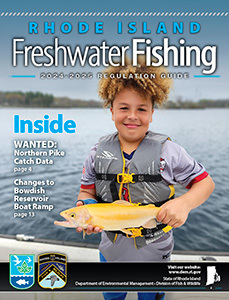General Information
Prohibited Activities:
- Fishing in any freshwater stream or pond within this state without a valid fishing license (except as noted on page 2).
- Fishing in any designated trout stream or designated trout pond of the state, unless otherwise regulated, between 11:59 PM on last day of February to 6 AM on the second Saturday of April, annually.
- Possessing trout, salmon, or charr during the seasonal closure.
- Using corn for bait in any designated trout waters.
- Chumming in any designated trout waters.
- Snagging fish in any fresh waters.
- Using any substance injurious to fish life in any stream or freshwater pond within the state except by permit issued by the DEM.
- Detonating any explosive within any stream or freshwater pond within the state.
- Selling of any freshwater fish including, but not limited to, trout, largemouth or smallmouth bass, pickerel, northern pike, Atlantic salmon, American shad, or yellow perch taken from any freshwater stream, river, or pond within the State.
- Stocking any freshwater stream or pond, public or private, within the state with ANY species of fish without having first obtained a permit from the DEM. For more information, call (401) 789-0281.
- Releasing any live bait into the freshwaters of the state.
- The use as bait of any variety of gold fish (Carassius auratus) in the fresh waters or estuarine waters of the State.
- The importation, sale, or possession of any variety of non-native fish, including, but not limited to goldfish (Carassius auratus), green sunfish (Lepomis cyanellus), or fathead minnows (Pimephales promelas) for use as bait in the fresh waters of the State.
- Selling any live freshwater minnows for bait or possessing more than one hundred (100) live freshwater minnows without first having procured the appropriate license from the DEM.
- Tagging, branding, marking, or otherwise willfully mutilating any fish which is to be released alive into any freshwaters of the state except by special permit issued by the Division of Fish and Wildlife.
- It is prohibited that any person use foot gear with external felt soles or other natural or synthetic porous material capable of absorbing liquid that is attached to the soles of wading foot gear in any freshwaters of the state. This shall include any waters shared with adjacent states in which any RI Fishing regulations apply.
- The taking of any fish in the freshwaters of the state by net, seine, trawl, or similar device, except for a dip net, for the landing of a fish caught by hook and line and the taking of baitfish, is prohibited. Cast nets and gill nets shall be prohibited.
- The taking of any fish in the freshwaters of the state by any means other than angling, utilizing a hook(s) and fishing line, except for carp, suckers, and fallfish, which may be taken by snares, spears or bow and arrow.
- Transport of any plant or plant part into or out of any Rhode Island waterbody on boats, vessels, other water conveyances, vehicles, trailers, fishing supplies, or any other equipment, with the exception of authorized research activities, such as species identification and management activities.
Fish Consumption Advisory
Since 1986, the FDA has issued warnings about mercury levels in various fish including freshwater species. The RI DEM and Department of Health wants our anglers to be familiar with the following information:
Fish is Good
- Fish is a good source of protein.
- Fish has many vitamins and minerals.
- Fish is low in fat.
- Fish can be part of a healthy diet, A healthy diet helps children grow and develop properly.
Mercury is Bad
- Mercury is a type of metal found in nature. It is used in thermometers, batteries, lamps, and other products. Sometimes mercury gets into ponds, lakes, rivers, soil, and air through pollution.
- When mercury pollutes the water, it can get into the fish where they live. If you eat fish with mercury, it can harm your baby when you are pregnant or breast feeding.
- Babies born to mothers who have a lot of mercury in their bodies may develop more slowly and have problems learning. Young children can also be harmed by mercury.
- High levels of mercury in the body can cause harm to an adult’s kidneys and brain.
- You cannot see, taste, or smell mercury in fish. Mercury cannot be cut away, cleaned or cooked out of fish. The best way to avoid mercury is to know which fish to choose and how much to eat.
Advice for Those Who Fish:
- Choose stocked trout to eat. See Trout Waters for trout stocking locations.
- Vary where and what types of fish you eat.
- Eat smaller fish (in accordance with RIDEM size limits).
- Avoid fish with the most mercury: bass, pike, and pickerel.
- Limit meals of black crappie and eel to one meal per month.
- Do not fish in private ponds, with no public access and those that are not stocked by the state.
- Trout from private vendors stocked into private ponds may be eaten.
- Do not eat any fish from the following ponds (with the exception of trout): Yawgoog Pond, Windcheck Pond, Meadowbrook Pond, Quidnick Reservoir, and the lower Woonasquatucket.
- Catch and release fishing is recommended in Mashapaug Pond and the Woonasquatucket River along with other urban ponds and rivers.
- Pregnant women and young children should limit their fish intake to include those fish that have tested low in mercury: stocked trout in freshwater, salmon, light tuna, shrimp, Pollock and catfish in marine waters.
For more information:
Visit https://health.ri.gov/healthrisks/poisoning/mercury/about/fish/ or call the Health Hotline at 1-800-942-7434.

